
Metal Gear Solid
Written by: Rik
Date posted: October 7, 2023
- Genre: Action
- Developed by: Konami
- Published by: Konami
- Year released: 2000
- Our score: 7
The PlayStation was the first non-handheld console I ever owned, and having secured a second-hand grey box along with my first priority, International Superstar Soccer Pro Evolution, I soon set about building up a collection of big-name console favourites that had fascinated and eluded me while growing up in a largely computer-based household. Bashed-about, low-price copies of Tekken, Ridge Racer, Resident Evil, Gran Turismo and Final Fantasy VII were all procured from the local games emporium, and promptly sat next to the console, largely untouched by human hand, while I played non-stop ISS Pro Evolution for the next couple of years.
Metal Gear Solid was the one exception, played and completed in an uncharacteristically swift manner during a post-exam phase in the summer of 2002. Specific memories of the experience, however, subsequently remained rather sparse, with only vague feelings of fondness and a sense that there were some rather lengthy cut-scenes, with almost comically gruff voice acting, being retained. Soon afterwards, the cycle was repeated again with the release of the PS2, at which point the next generation of the same franchises were also acquired; however, this time even the box containing the much-anticipated MGS sequel, Sons of Liberty, joined the others on the pile as the domination of Pro Evolution Soccer became total.
The fixed-up GOG ports of both games seemed to represent an opportunity to revisit the series without wrestling with slightly sketchy original PC releases (or at least they did until Sons of Liberty was pulled due to some copyright issue, and Konami subsequently decided to release a new collection on PC, due out later this month) and so I figured it was time to see if I actually did once complete some kind of stealth-type game without getting too worried or repeatedly messing things up, or whether the whole experience was a figment of my imagination.
In a way, it’s entirely appropriate that I should have such spotty memories of the experience, as Metal Gear Solid has a general vibe of fairly crazy and dreamlike intensity, in which some heady cinematic styles are blended with a plot in which rather daft things are often said and done with a straight face, while at the same time all seeming completely plausible and rarely undermining your sense of involvement in the adventure as it unfolds. Ever had a dream that you thought could be a movie while you were in it, only for the notion to seem ludicrous once you woke up? Metal Gear Solid is kind of like that.
There’s very little preamble, and you’re thrown straight into an introductory briefing sequence that could be from a mid-90s Simpson/Bruckheimer film like The Rock or Crimson Tide, as two men growl back and forth about an extremely difficult and important mission behind enemy lines, which will begin the moment they stop talking. You are Solid Snake, absolutely the only person who could possibly undertake such a task with any chance of success, despite your evident reluctance, and pretty soon you’ll be attempting to infiltrate an Alaskan military base while avoiding any unnecessary attention. There’s no messing around at the outset: you’re going to have to learn how to sneak around while actually needing to sneak around. (Although if you really do want to practice, the PC version does have the option of some VR training missions not present in the original PSX release).
Having said all that, there’s plenty of in-game advice available from a backup team led by the other gruff man from the intro, Colonel Roy Campbell, which can handily be dispensed without any of the conversation arousing interest from nearby enemy soldiers, thanks to some ingenious technology known as the Codec, which allows you to speak without actually speaking (or something). It’s not the only thing that stretches credulity somewhat, so it’s best to just go with it, particularly as the Codec isn’t just used to deliver chunks of story as it unfolds, but also provides optional hints and support when you get stuck.
Equally vital is your radar technology – the in-game mini-map – which provides an overview of the immediate vicinity, showing you where your enemies are and what they can see. Stealth is the name of the game: if you get caught and the alarm is sounded, an endless wave of bad guys will descend upon you until you die, unless you can somehow find a hiding place for long enough for the alarm to be reset and the enemy to return to ‘non-suspicious’ mode. While weapons are used under certain circumstances, there’s no way to run and gun through the game, with stealth one of the available options. There are times to sneak, and times to shoot, and they’re mostly pre-ordained.
The stealth is quite elegantly done, as it should be, given that the game came with the phrase ‘Tactical Espionage Action’ written on the box. If it wasn’t the first genuine stealth game (on PC, Thief: The Dark Project might make a similar claim, and there were previous Metal Gear games on the MSX and NES, as well as loads of other obscure titles that I’m sure you know all about, tough guy) then it unarguably helped popularise the mechanic and embed it into mainstream gaming.
With a largely top-down view and the mini-map for assistance, it’s all set up for watching guard patterns and moving from safe place to safe place to get to a stated destination. When in hiding, behind a wall or another object, you can press up to get Snake to back against it, granting you a view down the adjacent corridor. Guards react to sound, which can be used to your advantage by knocking on a surface to deliberately distract them before moving in the opposite direction. Later, you’ll also pick up cardboard boxes, which you can use to hide (and move) in. The latter does have mild comic potential: guards will obviously still notice it moving around in front of them, and they’ll look inside one if they’re on alert, but at other times, a small box in a corner somewhere will arouse no suspicion.
Guards aren’t the only security measure to avoid: there are also security cameras, poisonous gas, infrared sensors and trap doors to contend with. Chaff grenades are useful for shutting down all electrics in the area for a short time, and there are other pickups that can also help you. Snake’s initial entry into the base gives him an excuse for travelling light, which means you need to steal most equipment from the base using security cards picked up along the way. To get maximum benefit, a certain amount of backtracking when you get a new card is necessary, and is easy to forget about, as this isn’t a game where you tend to explore too freely, instead being directed to your next objective by predetermined events and/or Codec calls. Still, if you forget to, say, pick up the infrared goggles at the earliest opportunity, Snake can still light up a pack of cigarettes (don’t worry, a health warning is displayed) and use the smoke to show the position of the various laser beams. Tasks might be made harder by not picking something up, but you’re rarely put in a position where you don’t have what you need to progress.
As a non-stealth guy, it feels hard to compare to contemporary (or any) similar titles. You definitely have to get the hang of the mechanics to progress, while saves are limited to a checkpoint system, so you do have to get through a particular section in one go. It also has to be said that the base does feel massive, even though it probably isn’t, because of how the narrative and between-level interludes are handled, and it does genuinely feel like you’re undertaking a tense, high-stakes espionage mission. You won’t, however, be doing anything too advanced, like knocking people out and hiding their bodies, or hacking into computer systems to deactivate alarms or cameras.
Stealth, though, is roughly one third of MGS. The second piece of the puzzle involves beating a series of boss characters, using a combination of wits and weaponry. The prominence of these extended combat sections did seem slightly at odds with my sketchy memories of the game, as did the necessity to employ particular and rigid tactics for each one, with failure to do so resulting in swift death and the feeling that the task may well be impossible.
Arguably the old-school nature of these encounters and the level of violence contained within slightly undermines the semi-realistic approach of the stealth sections, but it’s something that’s fairly easy to roll along with in the context of the game. (Plus, I remembered that Alpha Protocol was often equally ludicrous, in different ways, and had silly boss fights too). However, these battles possibly aren’t the strongest part of MGS, with some fourth wall breaking solutions that may or may not be clever twists or annoying contrivances depending on your point of view. Help and hints are available via the Codec, which pauses the action in a slightly inconceivable manner while you discuss things at length with your buddies.
The other major element of MGS is the story, which is relayed via a combination of Codec conversations and lengthy cut scenes. Again, it’s possible that even those with a high tolerance for wordy interludes might still find this all a bit much. There are characters from, and references to, the previous Metal Gear games, although prior knowledge is hardly essential – nor, I would argue, is the need to quite follow exactly what’s going on at all times.
In a way, it’s quite a journey to revisit discussions of geopolitical matters in a pre-9/11 world, with generalised anxiety about nuclear weapons and their use by bad actors predominant. Whether you want to take in the detail of a back and forth of the nature of war or simply enjoy a gravelly voiced hero muttering enjoyably quotable lines about not having any more tears to shed, there’s a vibe of 90s action films which is hard not to get caught up in. If you don’t, though, then the frequent pauses for extended discussion and exposition will likely test your patience, although you can skip Codec dialogue and flick through the text if you prefer.
This was the game that made Hideo Kojima’s name, and if his ambition at the time was to be spoken of one day in the same way as many film directors, then he’s certainly achieved that, with those so-inclined able to identify signature tropes and throw his last name around in association with them in the same way that cinephiles might hammer on about famous filmmakers. Based on this game alone, it’s hard to take things entirely seriously, and perhaps not as seriously as intended, while still finding everything largely enjoyable.
All of the voice actors throw themselves into things with admirable gusto, with David Hayter as Solid Snake definitely earning a place in the all-time list of great gruff stubbly heroes. There are also some interesting cinematic approaches in the cut scenes, with the camera whirring all over the place at times and everything being thrown at the wall, including some fairly melodramatic music, in terms of ramping up drama. Arguably, this PC port doesn’t do the visual element any favours, despite its higher resolution, with motion blur and other effects that would be more effective on a traditional CRT TV screen being flattened and smoothed out, exposing the simple PSX polygons for what they are, particularly during cut-scenes.
Whether the PC is the natural home for this game in general is certainly open to question. Even in the GOG version, with various technical issues resolved, it’s a functional rather than polished affair. Modern joypads are supported, but I had to use the D-Pad rather than the analogue stick for movement by default. Graphics are 4:3, but leave a black border at the bottom for slightly weird technical reasons (something to do with the original PSX version apparently running at 320×224 and maintaining this aspect ratio), while a ‘save anywhere’ system is implied when it actually works on checkpoints, with loaded games defaulting back to the last location change or significant cut scene. The game can also be played in first person, as opposed to just having it as an optional static view, but I’m not really sure how much use it is in practice. Overall, it might all be a slight let down for a hardcore fan on a technical level, but for first-timers or casual belated revisiters of MGS, it all works well enough.
Metal Gear Solid holds up pretty well, and I was pleased to be able to revisit it and fill in some of the blanks in my memory. In the process, some of the more ludicrous and previously forgotten details – such as that bit at the end where (no spoilers) both protagonist and antagonist are suddenly, and without explanation, rendered shirtless for their final encounter – certainly raised a faint, but fond, smirk. While stealth fans may find holes to pick, it remains an effective and tense sneak ’em up, although personally the thought of repeating some of the tougher boss battles is perhaps sufficient for me to leave it alone for a while and stop short of a wholehearted recommendation. Others may also strongly dislike the lengthy exposition and dialogue exchanges (which, if skipped, don’t leave a massively long game). Still, most will find plenty to enjoy in dusting off this slightly sketchy port of an old classic and repeatedly hearing the classic refrain (all together now): Snake? Snake?! Snaaaaaake!


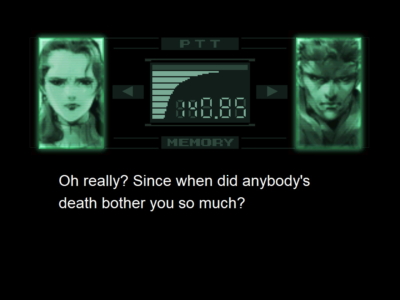
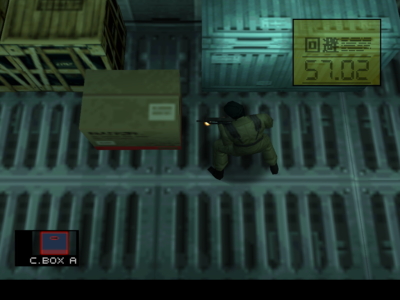
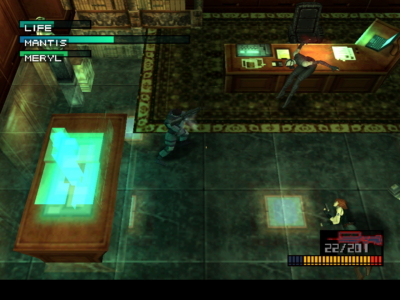
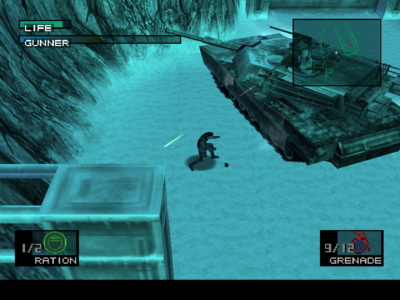
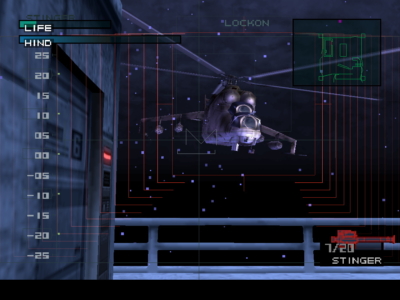

 Posts
Posts
Happy 400th review! Hoping to see 400 more!
How was the Psycho Mantis fight handled on PC? On Playstation, he would read save files on the memory card and comment on Konami. There were a few points specific to TVs, like making it look like the game shut off and displayed the default blue screen/“video” input. And of course, having to plug the controller in port 2 to stop his psychic dodges.
Anything updated for the PC? What’s the equivalent to controller port 2?
Great work, as always!
October 8, 2023 @ 4:04 am
I guess on PSX he must have commented on my love for ISS Pro Evolution, as that was another Konami game! I think all of that was cut out.
As for the controls… well, let’s just say I called the Colonel until he advised me to use another control method that most PCs have. I don’t know what happens if you only have one control method available to you in the first place, though.
October 8, 2023 @ 12:45 pm